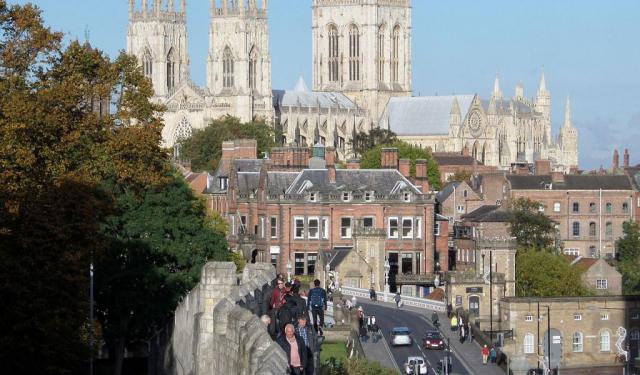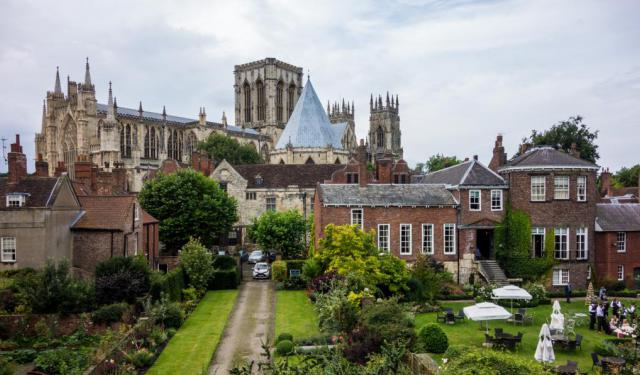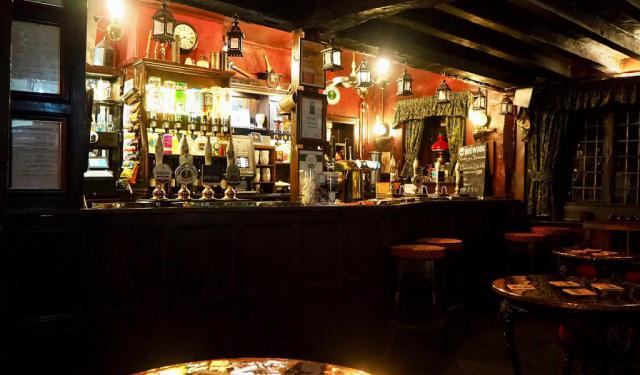Walmgate Bar, York
Walmgate Bar in York stands as a remarkably preserved medieval gateway, distinguished as the most complete among the city’s four primary historic entrances. It is notably the only remaining bar (gatehouse) to maintain its original defensive features including a barbican, portcullis, and inner doors.
The structure's origins trace back to the 12th century with its oldest part being a stone archway. Throughout the centuries, various components were added: the barbican in the 14th century, the oak doors in the 15th century, and a timber-framed building within the bar in the 16th century. This layering of architectural styles showcases the evolving defensive needs and aesthetic choices of different periods.
Historically, Walmgate Bar has witnessed significant events; it was set ablaze by rebels in 1489 during unrest caused by tax hikes, and it withstood the bombardment of cannon fire during the siege of York in 1644. These incidents underscore its strategic importance in the city’s defense.
In terms of etymology, the bar was originally known as Walbegate, with "Walbe" likely being an Anglo-Scandinavian personal name, indicating the cultural blend in the region’s historical context.
One of the most striking features of Walmgate Bar is its barbican, the only one still existing on an English town gate, accompanied by historically accurate reproductions of the 15th-century oak doors and a functional portcullis, underscoring its medieval military architecture.
The gateway also hosts an Elizabethan house on the inner side, notable for its extension over the gateway supported by stone Tuscan order columns. This house, occupied until 1957, adds a layer of domestic history to the bar's martial past.
The bar has been subjected to numerous restorations, particularly following significant damage - post the 1644 siege and after years of neglect by 1840. These restorations have helped preserve Walmgate Bar, allowing it to continue as a historical monument reflecting the architectural and social histories of York.
Tip:
Make sure to stop by Gatehouse Coffee which is set in the gatehouse and makes full use of the space, including the outside space on the Bar. Fantastic spot to break up a walk around the City Walls and brilliant cakes!
The structure's origins trace back to the 12th century with its oldest part being a stone archway. Throughout the centuries, various components were added: the barbican in the 14th century, the oak doors in the 15th century, and a timber-framed building within the bar in the 16th century. This layering of architectural styles showcases the evolving defensive needs and aesthetic choices of different periods.
Historically, Walmgate Bar has witnessed significant events; it was set ablaze by rebels in 1489 during unrest caused by tax hikes, and it withstood the bombardment of cannon fire during the siege of York in 1644. These incidents underscore its strategic importance in the city’s defense.
In terms of etymology, the bar was originally known as Walbegate, with "Walbe" likely being an Anglo-Scandinavian personal name, indicating the cultural blend in the region’s historical context.
One of the most striking features of Walmgate Bar is its barbican, the only one still existing on an English town gate, accompanied by historically accurate reproductions of the 15th-century oak doors and a functional portcullis, underscoring its medieval military architecture.
The gateway also hosts an Elizabethan house on the inner side, notable for its extension over the gateway supported by stone Tuscan order columns. This house, occupied until 1957, adds a layer of domestic history to the bar's martial past.
The bar has been subjected to numerous restorations, particularly following significant damage - post the 1644 siege and after years of neglect by 1840. These restorations have helped preserve Walmgate Bar, allowing it to continue as a historical monument reflecting the architectural and social histories of York.
Tip:
Make sure to stop by Gatehouse Coffee which is set in the gatehouse and makes full use of the space, including the outside space on the Bar. Fantastic spot to break up a walk around the City Walls and brilliant cakes!
Want to visit this sight? Check out these Self-Guided Walking Tours in York. Alternatively, you can download the mobile app "GPSmyCity: Walks in 1K+ Cities" from Apple App Store or Google Play Store. The app turns your mobile device to a personal tour guide and it works offline, so no data plan is needed when traveling abroad.
Walmgate Bar on Map
Sight Name: Walmgate Bar
Sight Location: York, England (See walking tours in York)
Sight Type: Attraction/Landmark
Guide(s) Containing This Sight:
Sight Location: York, England (See walking tours in York)
Sight Type: Attraction/Landmark
Guide(s) Containing This Sight:
Walking Tours in York, England
Create Your Own Walk in York
Creating your own self-guided walk in York is easy and fun. Choose the city attractions that you want to see and a walk route map will be created just for you. You can even set your hotel as the start point of the walk.
York Introduction Walking Tour
Established by the ancient Romans in 71 AD, the city of York breathes history. It first appeared as a walled settlement when the Ninth Legion of Rome conquered the local tribe known as the Brigantes. The town became the capital of the Roman province of Britannia Inferior, and later of the kingdoms of Deira, Northumbria and Jórvík, emerging as a major river port and part of the extensive trading... view more
Tour Duration: 2 Hour(s)
Travel Distance: 2.6 Km or 1.6 Miles
Tour Duration: 2 Hour(s)
Travel Distance: 2.6 Km or 1.6 Miles
York's Old Town
A vibrant city with Roman roots and a Viking past, York has played a central role throughout much of England‘s history. Despite its small size, Old Town York boasts a wealth of colorful heritage that draws tourists in droves from all over the world.
The maze of historic streets – too narrow for vehicles, and therefore solely pedestrian – are packed with attractions fairly close to one... view more
Tour Duration: 1 Hour(s)
Travel Distance: 1.3 Km or 0.8 Miles
The maze of historic streets – too narrow for vehicles, and therefore solely pedestrian – are packed with attractions fairly close to one... view more
Tour Duration: 1 Hour(s)
Travel Distance: 1.3 Km or 0.8 Miles
York City Wall Tour
Known variously as the York City Walls, Bar Walls, or the Roman Walls (although very little of the extant stonework has remained since Roman times) are the historic monument encircling the Old Town of York.
The surviving portion of the town wall – 3.4km (2 miles) – is longer than anywhere else in England. Built mostly in the 13th century (of magnesian limestone, and set upon earthen... view more
Tour Duration: 2 Hour(s)
Travel Distance: 3.8 Km or 2.4 Miles
The surviving portion of the town wall – 3.4km (2 miles) – is longer than anywhere else in England. Built mostly in the 13th century (of magnesian limestone, and set upon earthen... view more
Tour Duration: 2 Hour(s)
Travel Distance: 3.8 Km or 2.4 Miles
York's Historical Pubs Tour
Yorkshire is a haven for real ale enthusiasts and York does live up to this reputation. Many of local pubs are as old as churches, having served their clients for centuries.
There's a plethora of historic pubs in the heart of York, offering an array of quality cask ales alongside a menu of hearty British food, served in a cozy, traditional atmosphere. Low ceilings, wonky floors and open... view more
Tour Duration: 1 Hour(s)
Travel Distance: 1.3 Km or 0.8 Miles
There's a plethora of historic pubs in the heart of York, offering an array of quality cask ales alongside a menu of hearty British food, served in a cozy, traditional atmosphere. Low ceilings, wonky floors and open... view more
Tour Duration: 1 Hour(s)
Travel Distance: 1.3 Km or 0.8 Miles
York's Historical Architecture
Being home to some of the best preserved historic architecture in England, York screams history and is undoubtedly the must-go destination for anyone keen on the country’s past. While the more recent history has also characterized York, it is the abundance of the ancient sites retained in their variety – from Medieval times to the Georgian and Victorian eras, and more – that makes the city... view more
Tour Duration: 2 Hour(s)
Travel Distance: 3.1 Km or 1.9 Miles
Tour Duration: 2 Hour(s)
Travel Distance: 3.1 Km or 1.9 Miles








